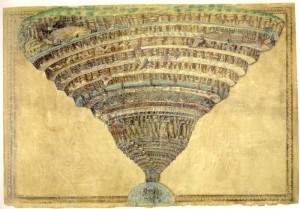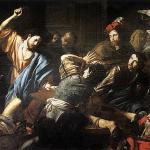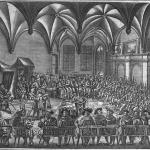EMILY: There is a huge shift between the Old Testament and the New Testament. Where God was once fire and brimstone and eternal damnation, Jesus is water into wine, and healing and forgiveness. Why, then, do we continue to read from the Old Testament?
GRANDPA: Emily, my reading of the Old Testament and the New Testament does not see them that way. For one thing, I can’t really understand Jesus without understanding His own religious commitments, and the teaching that marked His whole life as handed down to Him by Joseph and Mary.
God made a Covenant with the people of Israel and has never broken that Covenant. Humans have, but He hasn’t. I think of it this way: if Yahweh had broken that first Covenant, what right would Christians have for relying on the new Covenant He made with them? We Christians need constantly to be rereading the Jewish Testament (as I prefer to call it – since “Jewish” is to me more familiar and neighborly, not as distant as “Hebrew”). We need to reread it often in order to go deeper into the mind of Christ.
 Emily, I’m not sure I’m on the right track here. You’ll have to tell me directly whether I am getting at what you wanted me to, or completely missing the mark. I’m probably relapsing into my classroom manner again. But you’ll have to forgive me, at least part of the time, for being myself.
Emily, I’m not sure I’m on the right track here. You’ll have to tell me directly whether I am getting at what you wanted me to, or completely missing the mark. I’m probably relapsing into my classroom manner again. But you’ll have to forgive me, at least part of the time, for being myself.
An old but quite good introductory book for Catholics on how to read the two Testaments is The Two-Edged Sword by John A. McKenzie, S.J. McKenzie points out a constant motif of the Jewish Testament: the mercy of Yahweh, the love that He shows for Israel, His long and enduring patience, His desire to take the people of Israel under His wing as a mother hen gathers her chicks.
As I read the Jewish Testament – but I am no expert in it – the earliest parts of it are addressed to peoples near the beginning of civilization, and the authors write in very bold and often hyperbolic images as if to make a difficult point in the most vivid terms possible. How could early peoples even conceive of God as “Spirit and Truth”? Most peoples of the world, aware as they were of God’s presence, thought of Him as an idol of gold or of bronze, or perhaps like the Mayans, as a huge overpowering serpent, or as a fearsome jaguar of the night, and so on. The Jews alone reached a much higher conception of God. I feel you’ll agree with me that “Spirit and Truth” is less material, less crude than thinking of God as a thing – a stone idol, a snake, a jaguar.
“Spirit and Truth” is more like the intelligence that shines through the universe, more like the light in things which science seeks to uncover through hypotheses, testing, and bodies of theory. The light is always greater than the theories, and so science keeps advancing.
If you read the Jewish Testament as teaching a special people over many, many generations, one patient step at a time, you will detect significant shifts in the image of God presented by the prophets for popular understanding. They show that God loves humans and chooses them to be His friends – but they must choose to accept or to decline His offer of friendship.
He nonetheless makes those He loves to suffer. He tests their love. He does not offer them only sweetness. He offers also bitter myrrh, and often at the center of your life. Why would God be this way? Well, the prophets seem to say, He is. His ways are not our ways. As McKenzie’s title shows, often the Bible cuts like a sword. It gives pain as much as comfort.
My parents warned me not to spoil our children too much or make life too easy for them. “You have to teach them how to bear pain,” my father said. “You have to let them learn from mistakes. You have to let them go off on their own, even when you fear they will hurt themselves.”
Why God allows so much suffering in our lives is a really serious problem, one the Book of Job asks us to consider, without quite giving a fully satisfactory answer. The point is, even God recognizes the problem. To grapple with this problem is one very good reason for reading the Jewish Testament.
A further point we learn from the Jewish Testament is sketched vividly in Norman Podhoretz’s The Prophets, namely, a grand ethical vision of the human capacity, even in pain, for reflection, deliberation, and responsible choice.
In short, the Biblical vision teaches the human being that, beyond anything else, she is a moral agent. She will bear many burdens, she will experience many joys, she will taste many pleasures, and she will feel the whip of many pains. But throughout she will be called by One who loves her, to respond in her life with the zest of a free creature, noble endurer of misfortune, and grateful participant in the many pleasures the Lord has put on the table of human life. She will be called by One who loves her, to act as a noble, valiant woman. As did her ancestors.















